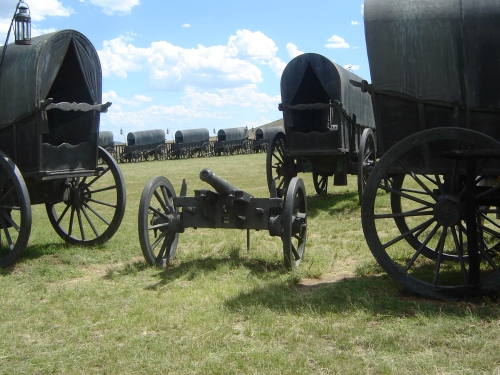MONDAY, 11 APRIL 2016
As a child, I regarded the Great Trek (migration of thousands of Boers from the British-controlled Cape colony to the hinterland of Southern Africa) more as Biblical history than as ordinary history, and I knew very well that one thought differently about Biblical history, you talked about it differently, and you studied it in a different manner.
Like the Biblical stories, the Great Trek was filled with super figures: Piet Retief, Gerrit Maritz, Andries Pretorius, and the woman who said that she would rather walk barefoot over the Drakensberg than to suffer again under British rule. There were also arch-enemies of the calibre you could only find in the Bible – the most infamous, the most vicious of which was Dingane, the king of the Zulus.
Then there were events which were of such epic nature that as a child you had no choice but to think of them as Biblical type-stories. In the first place there was the trek across the plains and later across the Drakensberg mountain range. Then there was the murder of Piet Retief and his party by their arch-enemy and his Zulu impis. And finally there was the epic triumph at Blood River, when against all expectations the Trekkers defeated their enemy who had outnumbered them ten to one. To seal the Biblical quality of the Great Trek story, God was also there, on the side of the Trekkers, as he was on the side of Israel more than twenty centuries earlier.
Seen from this angle, the Great Trek was the Boers’ Exodus story; the Eastern Cape was Babylon; Natal and the Free State and later the Transvaal were the Promised Land; Piet Retief was Moses; Andries Pretorius – Joshua; the English were the Egyptians; and Dingane was the Pharaoh, or Goliath that had to be slain on the battlefield by the small group of farmers, or then, by the faithful warrior David.
As a young student in a changing South Africa in the early nineties, I became aware of a process under historians to demythologise the Great Trek. It was apparently not such a massive movement of people after all; only something like 10% of the descendants of the original European immigrants had actually taken part in the trek. The victory at Blood River was also not really a miracle at all; the Trekkers after all did have modern weapons, and the Zulus had only had spears and hardened leather shields to protect themselves from the bullets.
On the one hand, then, you had the Great Trek as mythology that had been used for decades by politicians and the ruling elite to foster ethnic nationalism; on the other hand, discredited history, something that was not really as one had always been taught.
As I recently rediscovered, the truth is much more interesting than any inflated propaganda. If you look at the history of the Great Trek with an open mind, you will discover men and women and children of flesh-and-blood who had fears and doubts; people who loved and who lost people that had meant the world to them; people who ultimately hoped to settle down to a simple life once the dust had settled.
* * *
From an overview on The Great Trek Uncut: Escape from British Rule – The Boer Exodus from the Cape Colony 1836, by Robin Binckes: “The author distances himself from the noble characters stereotyped for the past two centuries and portrays them in their true light: wonderful, courageous people with human feelings, strengths and failings.”

______________________